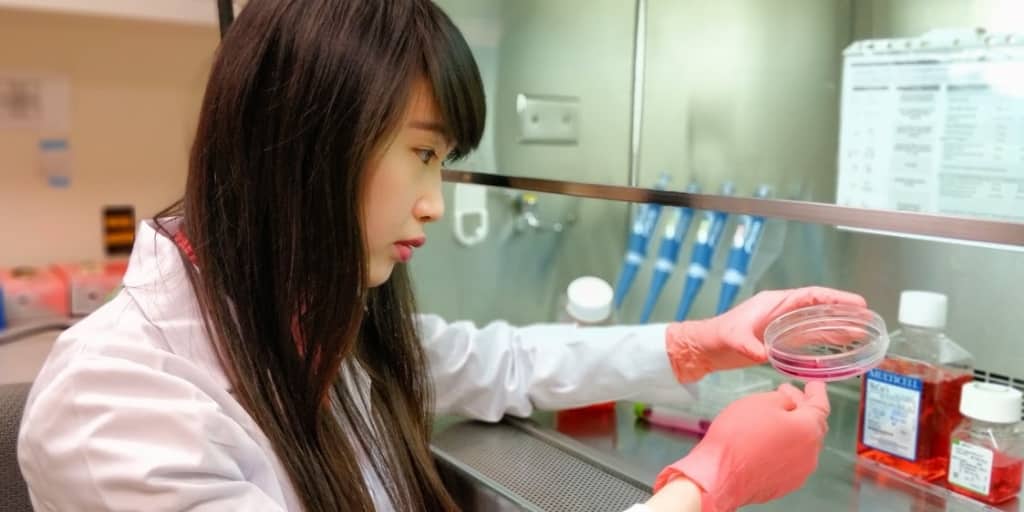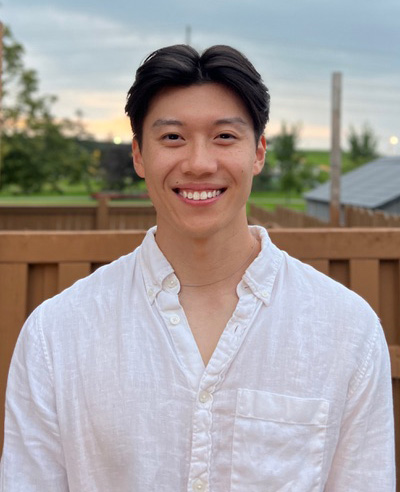1. Welcome back to the TBCRU, can you remind our readers who are you and tell us a little bit about yourself.
My name is Vy Ngo, and I am a Ph.D. candidate in the Department of Pathology and Laboratory Medicine at Western University, working under the supervision of Dr. Martin Duennwald. I completed my BSc at McMaster University with a Double Honours Specialization in Biology and Psychology. This is my second year in the Translational Breast Cancer Research Unit (TBCRU) program.
2. As a senior researcher, why is the TBCRU Studentship Award important to you, how does it allow you to advance your research?
Receiving the TBCRU Studentship has been a great honour, as I am pioneering my lab’s first breast cancer project. This award has helped to fund important resources for my work and has opened new opportunities for me to learn, network, and be a part of the breast cancer research community in London. This has allowed me to produce some exciting results that will pave the way for my future work.
3. In a few lines, can you remind us what you are doing and what problems do you hope to solve with your research?
I am investigating chemotherapy resistance in HER2+ breast cancer. HER2+ is a type of breast cancer that produces a protein that promotes the growth of the tumour. I am designing a unique approach using small molecules to enhance breast cancer therapies targeted against HER2. Through this research, I hope to improve treatment outcomes for patients with therapy-resistant HER2+ breast cancer.
4. Since we last spoke, have there been any changes to or any advancements in your research?
I have found that HER2+ breast cancer cells produce high levels of a protein called Hsp90, and this is associated with reduced patient survival. I also discovered a link between Hsp90 and another protein called Nrf2, which can lead to chemotherapy resistance to chemotherapy. These results provide an exciting avenue for further exploration and will be the focus of my ensuing work.
5. Have you had an opportunity to present your research to your peer researchers? Was it at a national or international meeting or in some other way?
I presented part of this work in a presentation at the Pathology and Laboratory Medicine Research Day in March 2019 at Western, and I was awarded the Dr. M. Daria Haust Award for the Best Basic Science Presentation. Part of this work was also included in a presentation at the 62nd Annual Conference of the Canadian Society for Molecular Biosciences (CSMB): Model Systems in Cancer Research meeting in Montreal in June 2019, and a poster presentation at the Proteostasis Researchers in Canada, Eh (PRinCE) meeting in Toronto also in June 2019.
6. Did that presentation setting help you share your breast cancer research with the broader scientific community?
Presenting my work at my department’s Research Day and two national meetings has allowed me to share my work with three different scientific communities. I was able to obtain feedback on my breast cancer research from researchers and experts in various fields.
7. Did any of the feedback or conversations that came about from presenting your research, help you and your research in any way?
I received a lot of great feedback and suggestions from researchers at all three meetings, some of which have been incorporated into my research experiments. I also had the opportunity to meet some new breast cancer researchers whom I gained valuable knowledge and insight from.
8. Now that you have had some more time with your research, how do you think your research will be applied in a real-world situation?
A significant portion of HER2+ breast cancer patients develops resistance to therapy, which is a great challenge. If my research project is successful, then our targeting approach could potentially be used for patients in the future to enhance the efficacy of existing therapies for HER2+ breast cancer patients.
9. Tell us about your involvement in the Breast Cancer Society of Canada fundraising events (Dress for the Cause, Mother’s Day Walk)?
Since becoming a TBCRU trainee in 2018, I have had the privilege to volunteer with fundraising bake sales for Dress for the Cause and raising funds and breast cancer awareness for the annual Mother’s Day Walk in May 2019.
10. What about your participation in other Breast Cancer Society of Canada donor events or tours, how has that impacted your perspective on breast cancer research?
I was given the privilege to attend the 2019 Lawson Impact Awards, where the Breast Cancer Society of Canada received a Community Partner of the Year Award. This opened my eyes to the impact the BCSC has in London and across Canada by supporting scientists and clinicians in improving the diagnosis, treatment, and prevention of breast cancer. This reiterated the importance of what we do and motivated me to keep pushing forward in my breast cancer research.
11. What are you currently reading, watching or listening to outside of the lab?
I am currently watching a volleyball TV series called “Haikyuu!!”.
Support researchers like Vy Ngo by considering a donation to the Breast Cancer Society of Canada. Find out how you can help fund life-saving research, visit bcsc.ca/donate today.




